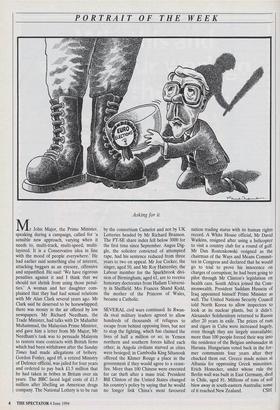PORTRAIT OF THE WEEK
Asking for it.
Mr John Major, the Prime Minister, speaking during a campaign, called for 'a sensible new approach, varying when it needs to, multi-track, multi-speed, multi- layered. It is a Conservative idea in line with the mood of people everywhere.' He had earlier said something else of interest, attacking beggars as an eyesore, offensive and unjustified. He said: 'We have rigorous penalties against it and I think that we should not shrink from using those penal- ties.' A woman and her daughter com- plained that they had had sexual relations with Mr Alan Clark several years ago. Mr Clark said he deserved to be horsewhipped; there was money in the air offered by low newspapers. Mr Richard Needham, the Trade Minister, had talks with Dr Mahathir Muhammad, the Malaysian Prime Minister, and gave him a letter from Mr Major; Mr Needham's task was to persuade Malaysia to restore state contracts with British firms which had been withdrawn after the Sunday Times had made allegations of bribery. Gordon Foxley, aged 69, a retired Ministry of Defence official, was jailed for four years and ordered to pay back £1.5 million that he had taken in bribes in Britain over six years. The BBC faced legal costs of £1.5 million after libelling an American drugs company. The National Lottery is to be run by the consortium Camelot and not by UK Lotteries headed by Mr Richard Branson. The Fr-SE share index fell below 3000 for the first time since September. Angus Dig- gle, the solicitor convicted of attempted rape, had his sentence reduced from three years to two on appeal. Mr Joe Cocker, the singer, aged 50, and Mr Roy Hattersley, the Labour member for the Sparkbrook divi- sion of Birmingham, aged 61, are to receive honorary doctorates from Hallam Universi- ty in Sheffield. Mrs Frances Shand Kydd, the mother of the Princess of Wales, became a Catholic.
SEVERAL civil wars continued. In Rwan- da rival military leaders agreed to allow hundreds of thousands of refugees to escape from behind opposing lines, but not to stop the fighting, which has claimed the lives of half a million or so; in Yemen northern and southern forces killed each other; in Angola civilians starved as cities were besieged; in Cambodia King Sihanouk offered the Khmer Rouge a place in the government if they would agree to a cease- fire. More than 100 Chinese were executed for car theft after a mass trial. President Bill Clinton of the United States changed his country's policy by saying that he wad no longer link China's most favoured nation trading status with its human rights record. A White House official, Mr David Watkins, resigned after using a helicopter to visit a country club for a round of golf. Mr Dan Rostenkowski resigned as the chairman of the Ways and Means Commit- tee in Congress and declared that he would go to trial to prove his innocence on charges of corruption; he had been going to pilot through Mr Clinton's legislation on health care. South Africa joined the Com- monwealth. President Saddam Hussein of Iraq appointed himself Prime Minister as well. The United Nations Security Council told North Korea to allow inspectors to look at its nuclear plants, but it didn't. Alexander Solzhenitsyn returned to Russia after 20 years in exile. The prices of rum and cigars in Cuba were increased hugely, even though they are largely unavailable; more than 100 people forced their way into the residence of the Belgian ambassador in Havana. Hungarians voted back in the for- mer communists four years after they chucked them out. Greece made noises at Albania for oppressing Greek minorities. Erich Honecker, under whose rule the Berlin wall was built in East Germany, died in Chile, aged 81. Millions of tons of sod blew away in south-eastern Australia; some of it reached New Zealand. CSH


























































 Previous page
Previous page